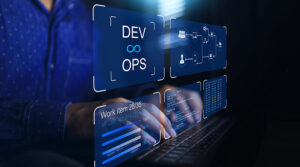DevOps is a popular software development methodology designed to help handle the increased demand for new apps. As a result, there are many DevOps career opportunities, and we will explore one such vocation: DevOps Engineer.
This article provides a DevOps engineer job description, including what they do, the needed qualifications to get a DevOps job, the roles and responsibilities, related online training, and even which types of employers hire the most DevOps engineers.
Let’s get the ball rolling by first defining DevOps and then getting into DevOps engineer roles and responsibilities.
What Does a DevOps Engineer Do?
Before giving a DevOps engineer job description, we should review what DevOps is. DevOps is a portmanteau of the words “development” and “operations,” a software industry methodology that automates and integrates the two traditionally siloed software development teams and IT operations. This merging is designed to shorten and improve the systems development life cycle.
Consequently, DevOps engineers are responsible for facilitating this practice. The role combines the elements of a technical and an IT operations role. DevOps engineers can handle coding duties in one instance and project management and planning in another.
DevOps engineers typically manage software development operations, engineering tools implementation, and their knowledge of the software development process to streamline software creation and its updates. DevOps engineers generally are senior-level technology professionals who take charge of and coordinate the various teams that develop or use the company’s software. They also oversee updates to the code and often assume different roles as they aid colleagues in developing, designing, testing, and releasing applications to the customers. DevOps engineers typically possess a robust understanding of the agile methodology and IT industry standards, plus the specific networks and processes within the company.
Also Read: DevOps Tutorial: How to Install Docker on Ubuntu?
Typical Roles and Responsibilities of DevOps Engineers
Here’s a convenient list of specific DevOps engineer roles and responsibilities, and most DevOps job description examples include many, if not all, of these.
- Building and setting up new development infrastructures and tools
- Understanding stakeholder needs and KPIs and relaying this information to developers
- Planning team structure, activities, and all aspects of involvement in project management activities
- Working with software developers and engineers to ensure development follows the established processes and everything works as intended
- Choosing and deploying the appropriate CI/CD tools
- Finding new ways to automate and improve the development and release processes
- Examining and testing code written by other team members and analyzing the results
- Identifying technical problems and developing necessary software fixes, patches, and updates
- Ensuring that the organization’s development systems are safe against cybersecurity threats
- Mentoring and guiding the team members
- Planning out new projects and being involved in making project management decisions
Qualifications and Training Required to Become a DevOps Engineer
DevOps engineers are highly skilled technical professionals with a strong computer science background and extensive knowledge of industry-standard tech tools. DevOps engineering positions require solving many problems, so qualified candidates must understand the software development methodology from different perspectives.
DevOps engineers usually have at least a bachelor’s degree in computer science or an engineering-related field. However, some employers will accept an equivalent related work experience instead of a formal degree. Additionally, some employers may look for specific professional development courses in a candidate’s resume or CV to show past success in essential areas of DevOps areas such as Linux administration or SQL developer certifications.
Essential Skills and Areas of Experience for DevOps Engineers
DevOps engineers require experience working with a variety of software tools. They typically have an information technology (IT) background or have worked in system administration or software development. Well-rounded DevOps engineers should have knowledge or experience in these technical areas:
- Cloud technology
- Container concepts
- Deployment automation and orchestration
- Orchestration
- Infrastructure automation
- Open-source OS
- Source control
Additionally, DevOps engineers should possess the following essential skills:
- Outstanding teamwork and communication skills
- Knowledge of multiple programming languages (e.g., Java, Python, Ruby)
- Strong problem-solving skills
- A good eye for detail
- A solid grasp of continuous integration and continuous deployment (CI/CD) pipelines
- Process automation
- The ability to configure and manage databases such as Mongo or MySQL
- Configuration management
- Working knowledge of various tools, open-source technologies, and cloud services
- Excellent organizational and time management skills
- The ability to multi-task, working on multiple projects at the same time
- An acute awareness of DevOps and Agile principles
- Training and knowledge in specific tools like Docker, Git, and Jenkins
- The ability to delegate tasks intelligently and efficiently
Also Read: How to Become a DevOps Engineer: A Complete Guide
Who Typically Employs DevOps Engineers?
DevOps is a versatile methodology that’s gained wiped acceptance among various industries. Here’s a brief, generalized list of typical DevOps engineer employers:
- Specialist software development companies
- Websites and any organization that hosts and manages websites
- Technological consultants
- Telecommunications companies and broadcasters
- Retailers
- Public sector organizations (e.g., education, food security, health services, infrastructure, natural resources, public transportation, safety, security, welfare, social housing, and the legal system.
But now, let’s get into some specifics. According to Glassdoor.com, these are the top-paying industries for DevOps engineers.
- Energy, Mining, and Utilities. $156,791 per year. This pay is 10% higher than other industries.
- Retail and Wholesale. $152,326 per year. This pay is 7% higher than other industries.
- Manufacturing. $151,094 per year. This pay is 6% higher than other industries.
- Human Resources and Staffing. $147,623 per year. This pay is 4% higher than other industries.
- Pharmaceutical and Biotechnology. $146,882 per year. This pay is 4% higher than other industries.
How Well Do DevOps Engineering Professionals Get Compensated?
Glassdoor.com reports that the average DevOps engineering professional in the United States makes $133,385 annually. This range goes as low as $86K and as high as $213K. Actual salaries rely on factors such as location, the job market, the applicant’s skills and experience, and the number of years on the job. For example, Glassdoor shows that beginners (0-1 years of experience) make an average of $124,033 annually, while a senior engineer (10-14 years of experience) earns $155,672.
Starting salaries can also vary depending on the DevOps engineer job description the company releases. The more the hiring company expects of their DevOps engineers, the better the starting compensation (theoretically).
Careers Related to DevOps Engineering
Other IT-related careers can potentially overlap with a DevOps engineer job description. This overlap can be helpful if you leave the field and take your career in a different direction. Here are some job titles that share an affinity with DevOps engineering:
- Automaton engineer
- Build and release engineer
- Cloud engineer
- DevOps architect
- DevOps manager
- Security engineer
- Software developer
- Software engineer
- Web developer
Also Read: What is Azure DevOps? A Complete Guide
How Do You Get a DevOps Engineering Career Off the Ground?
So, you like the idea of working in DevOps. The compensation is attractive, the prospect of a secure career piques your interest, and you’re keen on the DevOps philosophy. Great! How do you start meeting the requirements of a DevOps engineer job description?
Follow these steps, and you’ll be on a secure path to a fulfilling career as a DevOps engineer.
#1. Earn your bachelor’s degree. As mentioned above, most organizations want their DevOps engineer candidates to have an undergraduate degree. The best bachelor’s degrees for DevOps engineers include:
- Computer programming
- Computer science
- Information technology
- Software design
- Software engineering
- Or other related fields
#2. Learn how to program. This step could happen simultaneously with getting your degree. You must learn at least one of the following languages:
- HTML
- CSS
- C++
- Python
- JavaScript
Additionally, programming often requires a more complex understanding of data structures, something you can acquire through data analytics courses. Important topics include:
- Algorithms
- Cloud computing
- Containers
- Data structure
- Databases and SQL
- Integrated development environments (IDEs)
- Object-oriented programming languages (OOP)
- Text editors
- Web development
#3. Learn operating systems. DevOps engineers should be familiar with operating systems, including:
- Windows
- macOS
- Linux
- Android
- iOS
#4. Gain relevant certifications. Certifications teach valuable skills and show recruiters you have the necessary tools for the job. Consider certifications like:
- Professional Certificate in DevOps from a top university
- Architecting with Google Cloud Platform
- AWS Certified DevOps Engineer
- Certified Kubernetes Administrator (CKA)
- Docker Certified Associate (DCA)
- Microsoft Certified: DevOps Engineer Expert
- Puppet Certified Professional
#5. Acquire hands-on experience. Experience is a great teacher and looks good on a resume. Try working with other developers and get exposure to the typical DevOps processes. You can also practice writing code to automate any processes you’re exposed to or get an internship. Finally, don’t forget to set up a GitHub account and place your coding projects there, with a link on your resume.
#6. Start applying for jobs. Now that you have the tools, skills, education, and hands-on practice, it’s time to send out those applications. Good luck!
Are You Interested in Becoming a DevOps Engineer?
DevOps is an exciting field with lots of potential, so if this DevOps engineer job description appeals to you, it’s time to make a career a reality. We already know how vital the right skills are, so why not get a head start and sign up for this fantastic DevOps engineer bootcamp?
You can walk the line between software development and operations through an applied learning method and hands-on industry projects. You will gain hands-on skills in continuous deployment and configuration tools like Ansible, Puppet, Chef, and SaltStack. You will also pick up valuable skills in:
- DevOps Methodology
- DevOps on Cloud
- Configuration Management
- Containerization
- Continuous Integration/Continuous Delivery (CI/CD)
- Deployment Automation
- Source Control
Don’t delay; sign up today and get started on that exciting, promising new career in DevOps!
You might also like to read:
A Complete Cybersecurity Job Description
A Data Scientist Job Description: The Roles and Responsibilities in 2023
What Does a Coder Do? A Beginner’s Guide






